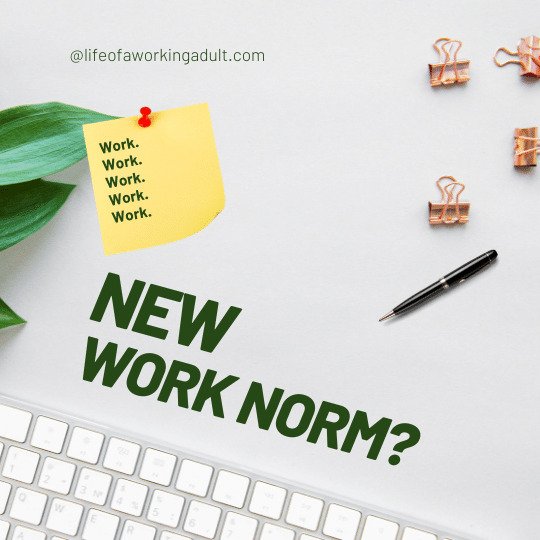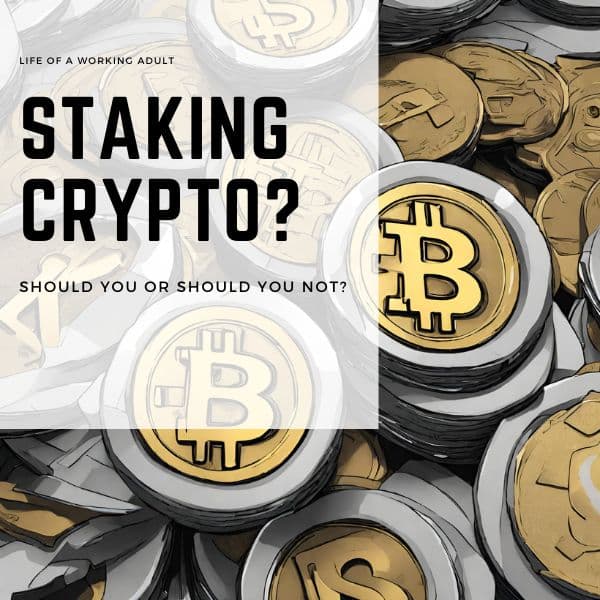We spend a great deal of our life at work places. After getting an education, our lives evolve around work a lot. Hence, our work dictates many aspects of our lives. We spend much of most productive years of our lives at work places. But post COVID-19, I wonder too, if a new working norm is finally emerging?
| Did you know? If you work on average 40 hours a week, for 52 weeks in a year, that’s 2080 hours a year spent working. That’s about 23.74% of a year. |

Work. Why?
Work – To keep up with life.
Once we get into the grind of life, earning a means becomes our main preoccupation. It will become the central focus of our lives thereafter. There just seems to be so many things around us seems that require payments and to make those payments, we need to work.
On top of that, there is also the pressure to keep up with just about anything in life too. Cars, houses, lifestyle and so on. Hence, we become slaves to the work hours so that we can keep earning to sustain and maintain our lives, and its facade. Unless if you are fortunate enough to come into a big inheritance.
Work – To pay ‘lifestyle maintenance fees’.
This is where the harsh realities become apparent. Modern comforts and pleasures are not free. They come at a price, and a hefty one too.
| Take this example: You walk into this premium burger establishment like Five Guys and order their most popular meal set. A burger, some fries and a milkshake later, you will need to swipe your credit card for about RM100. If you are a salaried worker earning RM4K a month, this is going to be almost a day’s hard earned pay. In the same evening, you find yourself at the gym which you pay membership of about RM250 a month. Add that to the utilities, and transportation costs that needs to be paid, it is not difficult to see why so many of us are trapped in this vicious cycle of needing to have a job. |
Our lifestyle needs a maintenance fee and there just seems to be endless amount of things that we can keep adding to that lifestyle. Welcome to the world of modern economic cycle where the same cycle is repeated, everyday in our lives!
Work. At what cost?
We have, then the mandated retirement age and labour laws created so that the working class can be regulated and protected. Yet the same scenario remains – the majority of the working class are required to work for their dues. It is a costly one for the worker. Long hours demanded by work these days means that a great deal of their waking hours are spent slogging away for their money. This means time for self, family, friends, and hobbies take a backseat and these are the very things that actually add a lot of value and meaning to life.
The long work hours have its social effects too. The rise of latchkey kids is one such phenomenon. Smaller families, urbanisation, compact housing, clogged roads are just some others that were added on with the changing demands of more time on the job.
Work. How did COVID-19 change it?
Then came the COVID-19 pandemic. Two years of COVID-19 has probably pushed a reset button for many. But, one thing stood out. Time. The clock has always ticked, of course. But there’s something about this moment. The pandemic showed to many of us how finite our time is.
Work – The power shift of time back to the workers.
COVID-19 changed the way majority work as logging on from home or hybrid setups became the new norm where possible. All of a sudden, the way time was spent was no longer determined by the boss one cubicle away, for five days a week. Hours spent on the commute were saved, and many found time for families as they learned to become more efficient in doing their work at home.
When you do the math, it really hits you – are you doing what matters?
Months of being forced to remain in our homes and away from workplaces returned a lot of that lost time to us, and many awakened to the realisation how much time work has taken us away from our lives. When you do the math, it really hits you – are you doing what really matters?
Work – People reprioritised priorities.
As we saw life after life being snuffed out by COVID-19, many of us began to feel our own mortality. In the face of more time for reflection, these made us question the way we work. Many wondered too if all that chasing for our careers is worth the best years of our lives. It is a question that many have had time to think about and reflect during the years of COVID-19 when the virus chased us away from the congregation of many guises, into the confines of our homes, where the seclusion gave us more time to reflect.
Being able to do it in the comforts of familiarity only made those realisations sink in deeper.
Work – People become a community again.
For those with kids, they actually got to spend more time with their children. Many kids didn’t need to go to their nannies. People got to know their neighbours. There was more sense of community spirit too. All because people had more time on their hands.
The life that we were all brought up to believe that work is all that matters more began to ring a little hollow.
Work – Brick and mortar establishments – an imminent comeback?
We have been told that going to work in a brick and mortar establishments helps to draw a demarcation line between work and personal lives. Being at work means that you will be able to focus, do the work that you are paid to do, be committed to your company for that duration of time that you are at work and not be distracted by other things. Turns out that these reasons might not hold so much water any more.
The reason is easy to see. Human beings are creatures of innovations. Hence, it is of no surprise that people began to adjust creatively to the new norm. Work blended into the personal space and efficiency increased because there were tangible benefits to be reaped. So, while there were those who lamented the loss of private time because of the incursion of work into their home space, many learned to multi-task and reaped the many benefits that came with it.
Work. Gen. Z will determine its future?
This, now at a time when many employers are trying to sell the idea of the benefits of returning to fully in person work. With the majority of the baby boomers, Gen X and Gen Y expressing their preference for hybrid or fully off-site divide, employers are now claiming that Gen Z, those just or about to enter the job market prefer to work in person.
It makes you wonder if their claim is true because you really have to wonder if Gen Z, who have lived much of their lives linked to the digital realm really want to be cooped up within four walls of a physical workplace for 10 hours in a row. This is the generation who, when the meta-verse takes form will probably dive in without even much blinking of an eye.
Or perhaps, all this hype about returning to the work place is more about control. When you place people within 4 walls, you can always exercise more control. Company culture, and practices can be forced upon every employee. Peer pressure becomes also a form of getting everyone to toe the line. You can always coerce your workers into whatever framework that is desirable.
When Industrial Revolution (IR) 1.0 happened, farm hands flocked to the factories. This first rise of the steam machines created the sweatshops and factories where workers slogged days on end. Working hours just kept getting longer after that. 3 more notable IRs came after the first Industrial Revolution. But it is with some irony here, too that perhaps what was started by the first Industrial Revolution is now slowly being undone by another, as automation and machine learning and all those other great technologies that come along with it free our time.
As for me, I have 3 gens in my family. My parents belong to the Baby Boomers gen. I am from Gen Y and my sibling is from Gen Z. All 3 generations are for hybrid rather than fully in-person. Hence, perhaps it is time too that we begin to plot a different sort of world for ourselves, one that is more focussed on meaning rather than just means.
Time is weird, amorphous and elastic, with the ability to speed up or slow down depending on everything from how much we like something to how busy we are. At its core, time is really about memory and what you’ll take with you after the seconds have passed.
Check out also: Say Hi to Hybrid Working! – What hybrid working has taught me?




